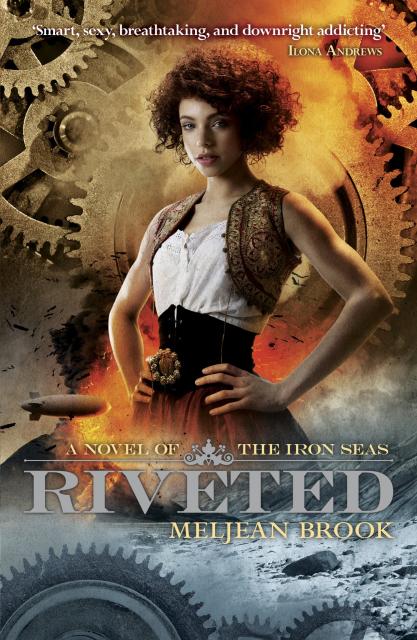 This Wednesday (21 June) I'll be giving a video presentation to a conference in the Canary Islands. My paper takes Meljean Brook's Riveted as a starting point for taking a look at changing attitudes towards "otherness" in popular romance fiction. I've written a little bit about the novel elsewhere on this blog but here's an abstract of what I'll be saying on Wednesday:
This Wednesday (21 June) I'll be giving a video presentation to a conference in the Canary Islands. My paper takes Meljean Brook's Riveted as a starting point for taking a look at changing attitudes towards "otherness" in popular romance fiction. I've written a little bit about the novel elsewhere on this blog but here's an abstract of what I'll be saying on Wednesday:
Changing Attitudes to Others: Meljean Brook’s Riveted (2012) and its Context
Meljean Brook's Riveted (2012) is dedicated to Monica Jackson, a romance author who drew attention to the marginalisation of African American romance authors and their novels; her successors in this task include K. M. Jackson and Rebekah Weatherspoon. Riveted can be read both as evidence of changing attitudes towards "others" in the early twenty-first-century romance reading and writing community, and as an attempt to encourage readers to think more deeply and sympathetically about those who are marginalised and othered in a variety of ways, including on the basis of their sexuality, disability and ethnicity. Riveted also seems to challenge the gender-based othering which is extremely common in the genre.
Keywords: circunstancia, disability, gender, José Ortega y Gasset, K. M. Jackson, LGBTQ, Meljean Brook, Monica Jackson, othering, race, Rebekah Weatherspoon, romance, Stella Young
While I do discuss some of the ways in which Brook challenges common forms of "othering" which persist in the genre, I've tried to use her book as a springboard to bring together the voices of some of those who've been discussing various forms of "othering" and exclusion. My hope is that my paper will help preserve a flavour of those discussions and help other academics find them if they hadn't been members of the community at the time the discussions took place.
The plan is for the conference proceedings to be published at some point.
Other papers at the conference include:
María del Mar Pérez Gil (ULPGC): “‘Every inch a Spaniard’: Images of Spain in popular romance novels”
Inmaculada Pérez-Casal (Universidade de Santiago de Compostela): “Lisa Kleypas and the ‘outcast’ hero: A diachronic study”
María Jesús Vera Cazorla (ULPGC): “‘And they drive on the wrong side of the road’. An analysis of the Anglo-centric vision of the Canary Islands in three romance novels”
Aline Bazenga (Universidade da Madeira): “Language awareness in four popular romances set in Madeira Island”
María Isabel González Cruz (ULPGC): “English/Spanish codeswitching and borrowing in a sample of romances set in the Canaries”
María del Pilar González de la Rosa (ULPGC): “‘In a flash of perverse temper’: Acknowledging gender and the representation of women in a sample of romance novels set in the Canaries”
Johanna Hoorenman (Utrecht University): “Private treaties: Historical and contemporary Lakota Sioux romances by Kathleen Eagle”
María Henríquez Betancor (ULPGC): “Imagery of lovers in book covers: A gender approach to romantic novels”
Jayashree Kamble (LaGuardia Community College CUNY): “From Xinjiang to the British Isles: Examining escapism and the ‘othering’ of romance heroines in Sherry Thomas’s My Beautiful Enemy”
María Ramos-García (South Dakota State University): “Representations of the Other in paranormal romance and urban fantasy”
